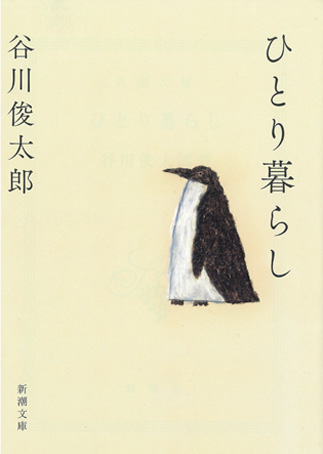
LIVES IN TOKYO AND THE REGIONS
Hitorigurashi
[Living Alone]
Shinchōsha (Shinchō Bunko), 2010. 237 pp. ¥605. ISBN 978-4-10-126623-7.
Also published in: Chinese (traditional and simplified characters) and Korean
For half a century, the contemporary poet Tanikawa Shuntarō has demonstrated the utmost flexibility in his use of the Japanese language. Readers can only admire the extent of his sophistication and the precision of his phrases as they bring the familiar world into clearer focus.
Hitorigurashi is a collection of essays conveying the miscellaneous daily impressions of the poet—who in his younger days considered the basic unit of human society to be a man and woman as a couple—as he begins solo life in his late sixties after three marriages and three divorces. The second half is in the form of a diary covering the years 1999 to 2001.
Centered on the poet’s residence in Suginami, a district not far from the heart of Tokyo, the book describes his casual excursions to exhibitions, movie theaters, and social gatherings with young poets, as well as meals farther afield at the homes of European friends. He is an unusually healthy senior, living by himself and taking a light pleasure in his lifestyle, although some nights he feels lonely as he listens to the radio.
“Yearning to return to an illusionary community where we can belong, we call and call each other’s cellphones, toil away at directionless email chat, throng at rock concerts, assemble at izakaya pubs, and throw ourselves into dubious religions,” he writes. “We, who once lived in unity, cannot bear the loneliness of individuality.” The poet’s ruminations on society and the world today are highly apt. (OM)
Hitorigurashi is a collection of essays conveying the miscellaneous daily impressions of the poet—who in his younger days considered the basic unit of human society to be a man and woman as a couple—as he begins solo life in his late sixties after three marriages and three divorces. The second half is in the form of a diary covering the years 1999 to 2001.
Centered on the poet’s residence in Suginami, a district not far from the heart of Tokyo, the book describes his casual excursions to exhibitions, movie theaters, and social gatherings with young poets, as well as meals farther afield at the homes of European friends. He is an unusually healthy senior, living by himself and taking a light pleasure in his lifestyle, although some nights he feels lonely as he listens to the radio.
“Yearning to return to an illusionary community where we can belong, we call and call each other’s cellphones, toil away at directionless email chat, throng at rock concerts, assemble at izakaya pubs, and throw ourselves into dubious religions,” he writes. “We, who once lived in unity, cannot bear the loneliness of individuality.” The poet’s ruminations on society and the world today are highly apt. (OM)

Translation rights inquiries
Sōshisha Publishing Co., Ltd.
(attn. Editorial Dept.)
5-3-15 Shinjuku, Shinjuku-ku, Tokyo
160-0022
Email: license@soshisha.com
(When sending an e-mail, please enter a half-width character "@" instead of a full-width character "@.")

